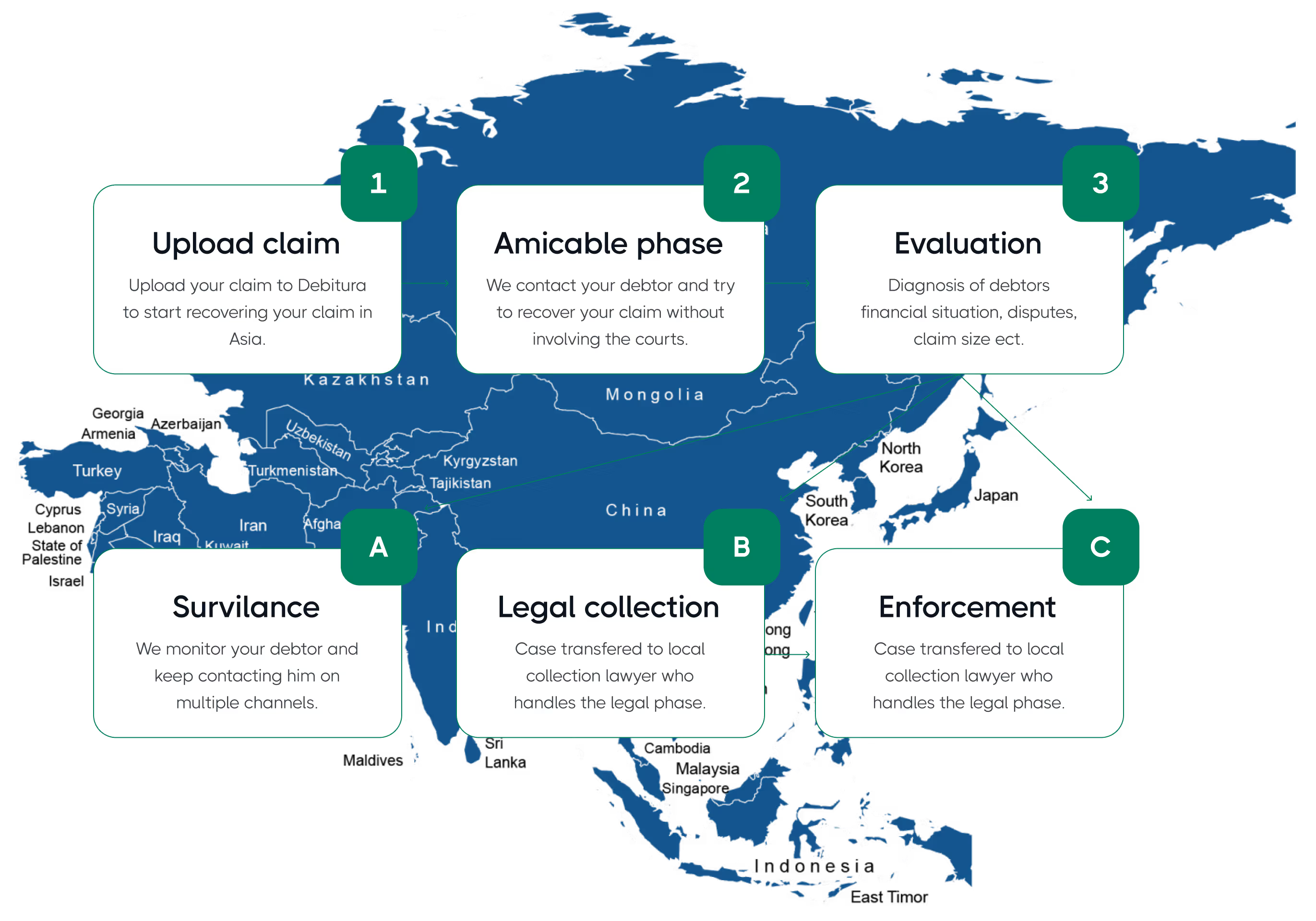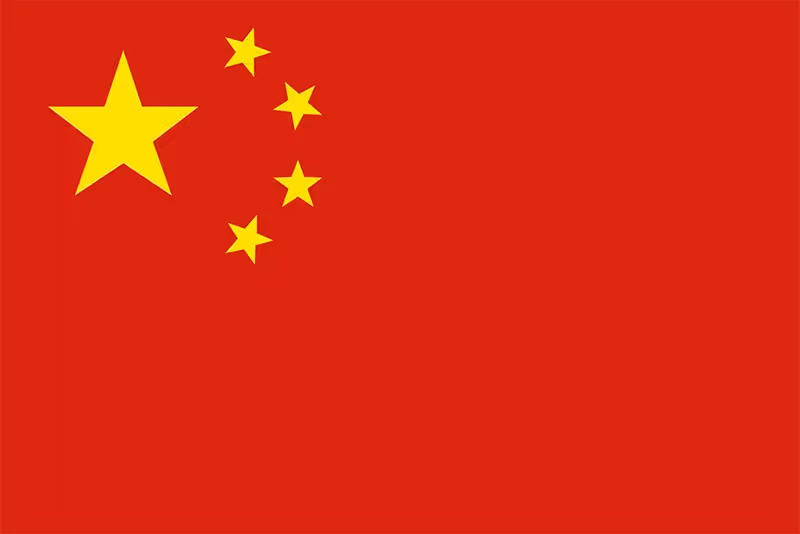Find the best debt collection agency in Asia
Never worry about collecting unpaid invoices in Asia again. Debitura connects you with the best collection agencies in Asia.
The ultimate guide to debt collection in Asia
Do you want to know how to collect debts efficiently? If yes, then this guidebook is for you! It provides helpful tips on debt collection in Asia, such as how to communicate with customers about unpaid invoices effectively.
By learning these techniques, businesses can save both time and money when dealing with delinquent payers.
We try hard to make sure you get your money on time. Our platform works with the best debt collection lawyers and agencies in all 48 countries across Asia. This way, you don't have to worry about missing payments! With our help, you can be sure that anyone you do business with will pay you on time and as agreed.
Spanning nearly half of the Earth's surface, Asia is home to 48 states that possess individualised legal systems and juridical directives. There are many complications when trying to collect debt in Asia. Foreign laws, customs and processes can make it very difficult for businesses. Language and cultural barriers can also cause a lot of problems.
If you partner with Debitura, you will get access to our network of local debt-collection specialists across all 48 Asian countries. You will gain invaluable insight from experienced professionals who are experts in their respective fields. Now that you know what we do let's learn more about how debt collection works in Asia.
The Asian economy
Asia is the world's largest and most populous continent, covering an area of 44,579,000 square kilometres. It is home to more than 4.5 billion people – over 60% of the world’s population – and stretches from Afghanistan in the west to the Pacific islands of Micronesia in the east. The continent is home to some of the world's oldest civilisations, and its cultural diversity is immense. With its rich history and wide range of climate zones, Asia is one of the most geographically diverse continents on Earth.
Asian economies have been growing significantly over the past few decades, making them one of the most dynamic regions in the world. In 2018, Asia accounted for 32% of the global GDP and is projected to be the leading contributor to global economic growth over the next decade. The region has seen rapid industrialisation and urbanisation, with many countries embracing new technologies and emerging industries. In particular, countries such as China, Japan and South Korea have grown rapidly in recent years, becoming some of the most powerful economies in the world.
Despite its immense economic potential, Asia is also home to many people living in poverty. Many countries remain underdeveloped with lower levels of education and health care. In addition, the region faces many environmental challenges, such as air pollution, deforestation and water scarcity. However, with the right policies in place, Asia has the potential to grow even further and become a powerhouse for economic development on a global scale.
The rise of Asian economies is creating new opportunities for businesses across the globe. Companies are increasingly investing in the region, taking advantage of its growing markets and labour force. With the continued growth of these economies, Asia is set to become a significant contributor to global economic prosperity.
China is the largest economy in Asia and the second largest in the world. It had a nominal gross domestic product (GDP) of 13.4 trillion USD in 2019, accounting for nearly 40% of Asia's total economic output. Over the last few decades, China has grown rapidly and become one of the most powerful economies in the world. The country has embraced new technologies and opened up its markets to foreign investment, becoming one of the leading hubs for global trade.
Japan is the second largest economy in Asia, with a nominal GDP of 5.1 trillion USD in 2019. It has been an economic powerhouse since the end of World War II, and is home to some of the world's most innovative companies. In recent years, Japan has been making significant investments in new technologies such as robotics and artificial intelligence, positioning itself to become a leader in the global economy.
India is the third largest economy in Asia, with a nominal GDP of 2.7 trillion USD in 2019. The country has seen considerable economic growth in recent years, becoming one of the primary drivers of global growth. India has embraced new technologies and is actively investing in infrastructure to become a competitive global player.
Overall, Asia is at the forefront of economic growth and development. With its vast potential for innovation and investment, it is poised to become a major contributor to global economic prosperity. By embracing new technologies and opening up markets to foreign investment, Asian economies can continue to grow and shape the world's future economy.
The growing power of Asian countries has also had a significant impact in other areas, such as international politics and global security. Many of the world’s most powerful militaries are located in the region, and countries such as China have become significant players on the world stage. With its increasing economic influence, Asia is set to significantly contribute to global governance and stability in the coming years.
The challenge with late payments in Asia
For generations, late payments have been a persistent and painful issue in Asia, leading to economic difficulties for many businesses and people.
52% of companies offer credit to B2B customers in Asia
It's pretty typical to sell goods and services on credit in Asia - particularly B2B invoices, where most industries make more than half their sales through this method. In China, 55% of all B2B transactions are made on credit, 57% in Hong Kong, 55% in Taiwan, 58% in Vietnam, 52% in India, 59% in Singapore and 51% in Indonesia. Overall 52% of all B2B invoices offer credit terms in Asia.
By granting credit to your customers, you will boost sales from existing clientele and acquire new patrons and remain competitive in the industry. Offering credit comes with several advantages for businesses!
Asian companies offer extensive credit terms.
The potential drawback of providing customers with credit is the financial risk associated with late payments. Late payment of invoices is a significant issue in Asia, with studies showing that the average payment delay is more than twice as long as in other parts of the world. According to a survey by the Asian Development Bank (ADB), the average payment delay for B2B invoices across Asia is 40 days, compared to 18 days globally. Actually, 15% of all B2B invoices in China come with more than 90 days of credit! On average, in Asia, 42% of all B2B transactions have payment terms of +30 days, 10% of 61-90 days, and 7% of +90 days. Over the last years, the payment terms have increased across all major countries in Asia.
It takes (much) time to settle overdue invoices in Asia
The average time it takes B2B customers to settle overdue invoices is 26% days in China, 23 days in Hong Kong, 35 days in Taiwan, 20 days in Singapore, 29 days in Indonesia, 28 days in Vietnam and 60 days in India!
With these figures, it’s easy to see that late payments can be a substantial financial burden for businesses in Asia. This is why debt collection methods are essential to ensure overdue invoices don’t damage the bottom line.
The key reasons that B2B customers delay invoice payment include customer liquidity problems, administrative delays in the customer payment process, customer disputes, deliberate late payment and bankruptcies.
4.6% of revenue in Asia is written off as bad debt!
In China, 50% of all invoices are overdue, and 3% are written off as bad debt. 54% of invoices in India are overdue, and 8% are written off as bad debt. The worst-performing country is Singapore, where 9% of all invoices are written off as bad debt! The average bad debt rate across all countries in Asia is 4.6%.
This means the bad debt rate across Asia is significantly higher than the global average.
Be proactive when selling on credit in Asia.
The implications of these figures are clear: it's crucially important for businesses to ensure their invoices are paid on time, which is why debt collection is such an integral part of doing business.
Knowing how to manage debt collection can differentiate success and failure effectively. Here are a few tips that will help you get started:
- Make sure both parties understand and agree upon payment terms before making any agreements — this establishes an understanding of expectations.
- Send out regular invoices and friendly reminders when necessary — staying on top of these timely tasks ensures customers stay abreast of their payments.
- Keep in contact with clients regarding overdue payments — maintaining dialogue is vital for finding solutions quickly and efficiently.
The regulatory framework for debt collection in Asia
When pursuing a debt from an Asian debtor, the laws and regulations of the debtor country regulate the process. For instance, if you're looking to collect from an Indian counterpart, all proceedings must abide by the legal framework India outlines - including obtaining permits for debt collection activities and having knowledge of potential court proceedings should financial recovery require more intensive action. As such, creditors must make themselves aware of applicable rules based on which countries their respective debtors reside in before initiating any collecting procedures.
The Asian economic sector is significant to the global economy; however, debt collection in this region can be immensely intricate. The Asia Pacific (APAC) domain holds many countries rated as having "severe" complexity when collecting debts.
Unfortunately, most of the countries in Asia lack effective laws that can protect businesses against late payments. This often leads to time-consuming and convoluted legal proceedings in places like China, India, and Thailand.
There are several ways companies can get the money that people owe them. In general, the outcome of getting money that is owed depends on how long ago the debt was created.
In APAC, companies try to get overdue amounts mainly by using internal resources and external partners such as debt collection and legal agencies. Professional debt collection agencies are becoming more and more popular in Asia, where companies prefer to avoid inefficient and bureaucratic legal procedures.
The debt collection process in Asia
Each country has a different process for collecting debt. The image below explains our standard process for collecting debt in Asia:

1 Upload your claim
Need dependable assistance with your debt? Let Debitura help! We will provide you with three free, secure quotes from local Asian partners specialising in debt collection – all it takes is a few pieces of information. No matter the size or complexity of your case, our expertise and resources are here to make sure you'll get the money back that’s rightfully yours.
2 Amicable collection
Debitura offers a no-cure-no-pay solution for amicable collection, ensuring that you will only pay us if we recover your debt. Our team launches a "campaign" of notifying reminders to the debtor by email, SMS message and letters while also utilising all other available communication networks in that specific nation. With Debitura's help, we always aim to have either payment received or have them comprehend their debt along with setting up an instalment plan.
3 Evaluation:
I the debtor has not paid during the amicable phase, It may be the right time for you to think about the next steps. To make sure that we choose the best option for your situation, let us review some details like how much money they owe and if there’s any possibility of payment eventually coming through. Generally speaking, here are three choices:
A Surveillance:
Legal action may not be worth the cost if your claim is more minor than 2.000-5000 USD. We recommend debt surveillance instead - our team will keep trying to contact and negotiate with your debtor to reach a resolution that benefits both parties involved.
B: Legal collections:
If your claim is substantial, it's highly recommended that you pursue legal action. The exact strategy depends on where you are located and the size of your claim. Here at Debitura, we have associated with debt collection attorneys throughout Asia who can offer personalised advice and accurate estimation for any case.
C: Debt enforcement:
If you have an admission of debt or court order, the bailiff's court can assist with enforcing your legal claim.
Summary
Despite the difficulties, businesses can still receive payment for their overdue invoices in Asia. By familiarising yourself with local regulations and working with an experienced debt collection agency, your chances of success will skyrocket!
We are here to help you find a suitable partner that is right for you – we have networked partners all over 48 Asian countries who would be more than happy to facilitate receivables recovery. Get started now by reaching out to us; we offer three free quotes from various providers at no cost.
.svg)







.svg.avif)




.avif)
.avif)

.svg.avif)
.avif)
.avif)





.avif)
.avif)
.avif)
.avif)
.avif)

.avif)
.avif)











.avif)

.webp)
